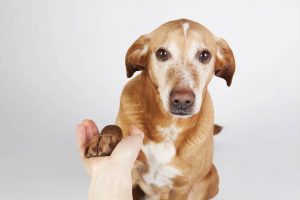Posts Tagged ‘teach an old dog new tricks’
You CAN Teach An Old Dog New Tricks!
 We have all heard the saying, “You can’t teach an old dog new tricks.” Not true! Yes, you can!
We have all heard the saying, “You can’t teach an old dog new tricks.” Not true! Yes, you can!
Most people associate training with young puppies, but the reality is that dogs are able to learn at any age. Surprisingly, adult dogs are often easier to train than younger puppies because they have more self-control. Whether you just adopted an adult dog, or your older pet needs to learn some new tricks, training offers mental stimulation and keeps your dog’s mind sharp. It is important that you be patient when training both adult dogs and puppies. If you have just brought an adult dog to your home, allow the dog time to adjust. Adult dogs have their own histories that may make them nervous about new surroundings. Don’t give up on the dog after only a few days. Adult dogs may need a period of adjustment which can take anywhere from a few days up to a month. Once the dog realizes that they have found their forever home, it will soon settle into being a part of the family.
Similar to housetraining a puppy, you should use a crate when housetraining an adult dog. You cannot assume that an adult dog is housetrained so you should keep it in a crate when you are not able to supervise it. When you release your dog from the crate, take your dog immediately to the place outside where you want your dog to relieve himself. If it does not relieve itself, re-crate your dog and try again later. Be sure that your crate is large enough and strong enough for your dog to fit comfortably. Your dog should be able to stand up, move around, and stretch out without difficulty. Soft-sided crates are often too flimsy to stand up to the needs of an adult dog so the best option is usually a metal crate that can be folded for easy transportation. Be sure to provide your crated dog with water, soft blankets, and chew toys as well as enough attention, exercise, and outdoor time so your dog can relieve itself.
If your dog is new to crates, introduce the concept slowly. Entice your dog to enter the crate by offering food and keep it in the crate for only a few minutes at first. Be sure to avoid using the crate as a form of punishment or leaving your dog isolated in its crate for long periods. The housetraining process usually goes by quicker for older dogs as they have more control over their bladders and bowels than young puppies do.
Whether you just brought your adult dog home, or your adult dog needs some training, an obedience class is a great place to do it. Obedience classes allows you and your dog to learn basic commands, such as lying down and walking on a loose leash. Even if your dog has never had any obedience training in the past, your adult dog will benefit from the class. Obedience classes also allow your dog to socialize with other dogs and people. You will be able to see how it reacts to other dogs and strangers and gives you the comfort of having a safe environment and a professional dog trainer on stand-by to offer advice.
If you bring an adult dog into your home, they may do things that they were allowed to do in their previous home that you do not want them to do in your home such as jumping on guests or lying on the furniture. To help your dog learn the rules of your house and more importantly, retrain them, be sure to start teaching the rules to your adult dog as soon as possible. The “Nothing in Life is Free” (NILF) dog training method is an effective way to teach your dog self-control. It requires that your dog behave appropriately before getting a desired treat, walk, or positive attention. Lastly, it is important that everyone in the household is on the same page. When different members of the family have different expectations on behavior, commands, and expectations, it can be confusing for the dog. When everyone agrees on appropriate behaviors and uses the same commands and rewards, your dog will learn faster and retain the training longer.
Most often, new owners of adult dogs do not know the experiences that the dog has had with training in the past. Positive reinforcement methods are the best bet for training. Using treats and plenty of praise is an effective method for training dogs of all ages and breeds. Keep things fun and upbeat instead of punishing your adult dog. It is a great way to strengthen the bond between you and your dog. It may take some work at the beginning, but teaching your dog the basic commands and working on solving behavior problems from day one means that your dog will soon settle into being a happy and healthy part of your home.
We are here to help you regardless of the age of your pet. If you have any questions, do not hesitate to contact our office!
